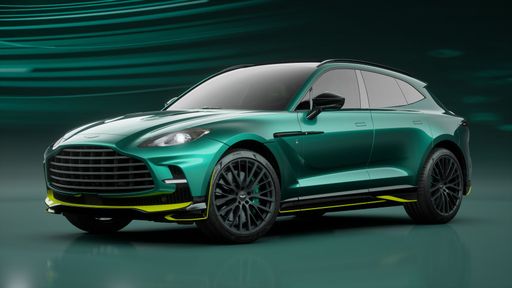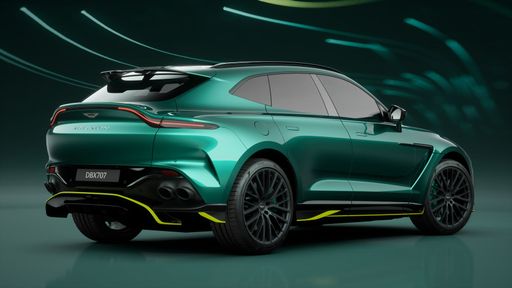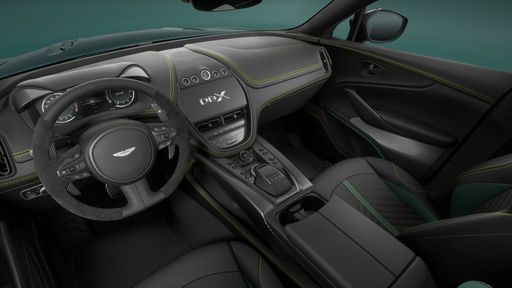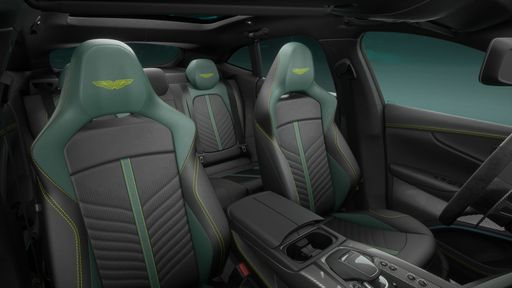Aston Martin DBX VS Hyundai Kona
Aston Martin DBX
The Aston Martin DBX represents the luxury brand's bold foray into the SUV market, combining sporty aesthetics with elegant design. It offers a luxurious interior that envelops passengers in comfort and top-quality materials, delivering an exceptionally refined driving experience. This vehicle seamlessly marries Aston Martin's storied racing heritage with the practical versatility needed for everyday adventures.
more informationHyundai Kona
The Hyundai Kona blends a bold design with a versatile interior, making it a standout choice in the compact SUV market. Its crisp handling and responsive steering provide an engaging driving experience, whether in the city or on the open road. The vehicle also offers a range of features designed to enhance comfort and connectivity, ensuring a pleasurable journey for both driver and passengers.
more information @ media.astonmartin.com
@ media.astonmartin.com
 @ media.astonmartin.com
@ media.astonmartin.com
 @ media.astonmartin.com
@ media.astonmartin.com
 @ media.astonmartin.com
@ media.astonmartin.com
 @ hyundai.news
@ hyundai.news
 @ hyundai.news
@ hyundai.news
 @ hyundai.news
@ hyundai.news
 @ hyundai.news
@ hyundai.news
Costs and Consumption |
|
|---|---|
|
Price
about 157300 - 204400
£
|
Price
about 22600 - 41600
£
|
|
Consumption L/100km
14.2 - 14.3
L
|
Consumption L/100km
4.5 - 6.7
L
|
|
Consumption kWh/100km
-
|
Consumption kWh/100km
14.6 - 16.8
kWh
|
|
Electric Range
-
|
Electric Range
377 - 514
km
|
|
Battery Capacity
-
|
Battery Capacity
1.3 - 65.4
kWh
|
|
co2
323
g/km
|
co2
128, 103, 141, 152, 0
g/km
|
|
Fuel tank capacity
87
L
|
Fuel tank capacity
38 - 47
L
|
Dimensions and Body |
|
|
Body Type
SUV
|
Body Type
SUV
|
|
Seats
5
|
Seats
5
|
|
Doors
5
|
Doors
5
|
|
Curb weight
2320
kg
|
Curb weight
1370 - 1773
kg
|
|
Trunk capacity
491
L
|
Trunk capacity
466
L
|
|
Length
5039
mm
|
Length
4350 - 4385
mm
|
|
Width
1998
mm
|
Width
1825
mm
|
|
Height
1680
mm
|
Height
1580 - 1585
mm
|
|
Payload
710
kg
|
Payload
420 - 490
kg
|
Engine and Performance |
|
|
Engine Type
Petrol
|
Engine Type
Petrol, Full Hybrid, Electric
|
|
Transmission
Automatic
|
Transmission
Manuel, Automatic
|
|
Transmission Detail
Automatic Gearbox
|
Transmission Detail
Manual Gearbox, Automat. Schaltgetriebe (Doppelkupplung), Reduction Gearbox
|
|
Drive Type
All-Wheel Drive
|
Drive Type
Front-Wheel Drive, All-Wheel Drive
|
|
Power HP
550 - 707
HP
|
Power HP
100 - 218
HP
|
|
Acceleration 0-100km/h
3.3 - 4.5
s
|
Acceleration 0-100km/h
7.8 - 13.3
s
|
|
Max Speed
291 - 310
km/h
|
Max Speed
162 - 208
km/h
|
|
Torque
700 - 900
Nm
|
Torque
200 - 265
Nm
|
|
Number of Cylinders
8
|
Number of Cylinders
3 - 4
|
|
Power kW
405 - 520
kW
|
Power kW
74 - 160
kW
|
|
Engine capacity
3982
cm3
|
Engine capacity
998 - 1598
cm3
|
|
Top speed
291 - 310
km/h
|
Top speed
162 - 208
km/h
|
General |
|
|
Model Year
2020 - 2022
|
Model Year
2024
|
|
CO2 Efficiency Class
G
|
CO2 Efficiency Class
D, C, E, A
|
|
Brand
Aston Martin
|
Brand
Hyundai
|
Aston Martin DBX
Discovering the Aston Martin DBX
The Aston Martin DBX marks the iconic brand's foray into the world of luxury SUVs. Born from the prestigious British marque, it combines Aston Martin's rich heritage with modern innovation. The DBX delivers not just style and elegance but also power and performance, distinguishing itself as a significant player in the luxury SUV segment. Let's delve into the details that make the DBX truly remarkable.
Engineering Marvel: The Heart of the DBX
At the core of the Aston Martin DBX is its powerful engine. Customers can choose from engines delivering between 550 PS and 707 PS, all guaranteeing a thrilling driving experience. The V8 engines boast a displacement of 3982 cm3, providing not only raw power but also a symphony for the ears with its distinctive exhaust note. Complementing this, the intelligent all-wheel-drive system ensures optimum traction and control, whether you're cruising on the highway or taking on more challenging terrains.
Performance Meets Efficiency
The performance figures speak for themselves. Acceleration from 0-100 km/h can be achieved in as little as 3.3 seconds, with a top speed of up to 310 km/h. Despite its robust performance, the DBX remains relatively efficient for its class, with a fuel consumption range of 14.2 to 14.3 L/100 km. This blend of performance and efficiency is achieved without compromise, showcasing Aston Martin's engineering prowess.
Luxury and Practicality in Perfect Harmony
As a luxury SUV, the DBX doesn't skimp on style or functionality. Its design is a seamless amalgamation of Aston Martin's luxury sedan attributes with the practicality required from an SUV. With a spacious interior capable of accommodating five passengers comfortably, it also offers a generous boot space of 491 litres. The combination of luxury materials and state-of-the-art technology ensures that no journey in the DBX is ordinary.
Technological Innovations
The technological features equipped in the DBX elevate the driving experience significantly. From the advanced infotainment system to safety technologies, every detail is tailored for both driver and passenger satisfaction. The DBX comes equipped with an automatic transmission system that allows for smoother, more efficient gear changes, enhancing both performance and comfort on the road.
Conclusion: The Aston Martin Legacy Continues
In entering the SUV market, Aston Martin has created a vehicle that remains true to its ethos of luxury, performance, and style. The DBX is more than just an SUV; it is a testament to Aston Martin's ability to innovate and adapt while staying true to its quintessential British charm. Whether you’re drawn to its formidable power or its luxurious appointments, the Aston Martin DBX represents a new chapter in the brand's storied history.
Hyundai Kona
The Hyundai Kona: A Comprehensive Overview
The Hyundai Kona has established itself as a standout in the compact SUV segment, blending innovation with performance and style. As the automotive world moves towards more sustainable and efficient options, the Kona offers a variety of powertrains, from traditional petrol engines to full hybrids and all-electric models.
Powertrain Options and Performance
The Hyundai Kona's powertrain choices cater to a wide range of preferences. For petrol enthusiasts, the Kona offers a 1.0L T-GDI engine, delivering 100 PS, and a more robust 1.6L T-GDI variant with up to 170 PS. Those looking for efficiency without sacrificing power can consider the full hybrid model, offering 129 PS and an impressive consumption of 4.5 L/100km.
For a greener option, the all-electric Kona provides a compelling case. With battery capacities of up to 65.4 kWh, the electric Kona offers power outputs of 156 to 218 PS, and efficiencies as low as 14.6 kWh/100km, enabling an electric range of up to 513 km.
Technical Specifications and Innovations
Built on a robust platform, the Kona delivers versatility and reliability. With a choice between manual or dual-clutch automatic gearboxes, along with options for front-wheel or all-wheel drive, the Kona ensures a tailored driving experience. The handling is enhanced by the car's lightweight construction, balancing a 1370 to 1773 kg curb weight with dynamic performance.
The Kona's design doesn't compromise cargo space for style; it offers a generous 466 L boot capacity. With a relatively compact body, measuring 4350 to 4385 mm in length, the Kona easily navigates urban environments while still commanding a strong road presence with its 1825 mm width.
Efficiency and Eco-Friendliness
Hyundai is committed to reducing emissions, as evidenced by the Kona's CO2 efficiency ratings, which range from class A for electric models to class D for some higher-performance petrol variants. The focus on reducing environmental impact without sacrificing driving pleasure is notable throughout the Kona range.
Costing and Value
The Hyundai Kona offers commendable value for money. Pricing starts at €26,400 and reaches up to €50,690, depending on the chosen configuration. The monthly running costs range from €956 to €1090, with a cost per kilometre of 38.3 to 43.6 cents, making it a competitive option in its class.
Conclusion: Modern, Efficient, and Versatile
The Hyundai Kona stands as a testament to Hyundai's commitment to innovation, efficiency, and practicality. Whether you are inclined towards a traditional combustion engine, a hybrid for a balance of power and efficiency, or a full electric model for maximum eco-friendliness, the Kona provides a tailored solution for each unique driver preference.
